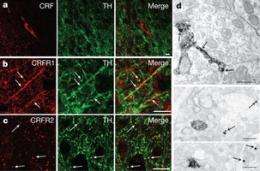September 20, 2012 report
Researchers find link between peptide that switches during stress and depression

(Medical Xpress)—Researchers working out of the University of Washington have found that a certain peptide normally involved in helping the brain experience pleasure is caused to switch when subjected to long term stress, leading to depression. The team in trying to understand why long term stress in people quite often leads to debilitating depression, ran some simple experiments in mice that showed, as they describe in their paper published in the journal Nature, that a peptide called corticotropin-releasing factor (CRF), normally involved in helping to release dopamine in a certain part of the brain, causing pleasurable feelings, switches to a non active state leading to symptoms of depression when the mice were exposed to a stress inducing environment.
Scientists have known for some time that long term stress can lead to depression, but not why it happens, though the suspicion has been that it had something to do with the nucleus accumbens, a section in the brain believed to be involved in feelings of punishment and/or reward. They've also thought that CRF might play a part as it binds to receptors in that part of the brain. To find out what role CRF actually has in the whole process, the researchers set up an experiment to test its impact on mice.
In the first part of the experiment, the team infused CRF into the brains of one group of mice while another got a placebo shortly after being placed in a new cage. Those that got the CRF, quite naturally, formed a pleasurable attachment to the new cage, while those given a placebo did not. Next, another group of mice were stressed by forcing them to swim in water several times a day for two days (something that previous research has shown causes mice to become depressed) then were subjected to the same experiment as the first two groups. This time, infusing the mice with CRF did not result in the mice forming pleasurable attachments to the new cage, and in some cases caused some to dislike it altogether. Even more alarming was that they kept repeating the cage test over and over periodically and found that it took up to ninety days for the mice to fully recover from the stressful conditions they'd experienced.
The results show, the team says, that CRF is clearly involved when mice, and likely people, are exposed to long term stress and how it can lead to depression. The next logical step then, is to see if there is a way to counteract the impact stress has on CRF, thereby heading off depression.
More information: Severe stress switches CRF action in the nucleus accumbens from appetitive to aversive, Nature (2012) doi:10.1038/nature11436
Abstract
Stressors motivate an array of adaptive responses ranging from 'fight or flight' to an internal urgency signal facilitating long-term goals. However, traumatic or chronic uncontrollable stress promotes the onset of major depressive disorder, in which acute stressors lose their motivational properties and are perceived as insurmountable impediments. Consequently, stress-induced depression is a debilitating human condition characterized by an affective shift from engagement of the environment to withdrawal. An emerging neurobiological substrate of depression and associated pathology is the nucleus accumbens, a region with the capacity to mediate a diverse range of stress responses by interfacing limbic, cognitive and motor circuitry. Here we report that corticotropin-releasing factor (CRF), a neuropeptide released in response to acute stressors and other arousing environmental stimuli, acts in the nucleus accumbens of naive mice to increase dopamine release through coactivation of the receptors CRFR1 and CRFR2. Remarkably, severe-stress exposure completely abolished this effect without recovery for at least 90 days. This loss of CRF's capacity to regulate dopamine release in the nucleus accumbens is accompanied by a switch in the reaction to CRF from appetitive to aversive, indicating a diametric change in the emotional response to acute stressors. Thus, the current findings offer a biological substrate for the switch in affect which is central to stress-induced depressive disorders.
© 2012 Medical Xpress














